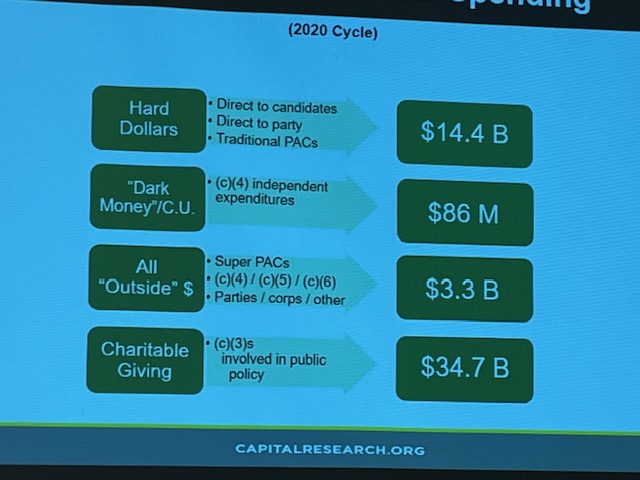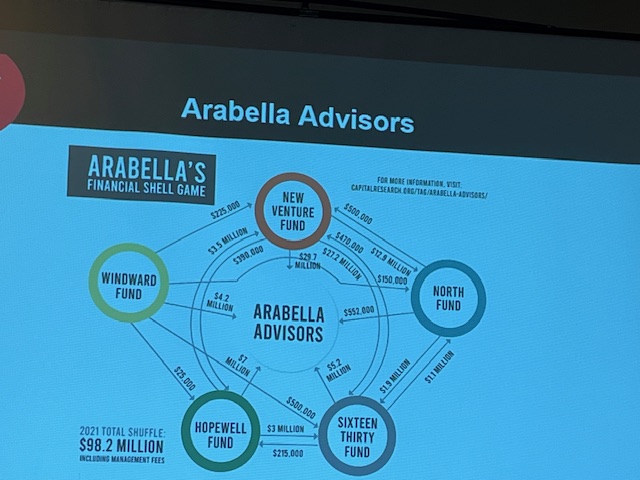Election integrity has been on voters’ minds more since the 2020 election, both across the US and in North Carolina. The subject was discussed at the recently held John Locke Foundation’s Carolina Liberty Conference.
The “Past, Present, and Future of NC Elections” panel discussion was hosted by Dr. Andy Jackson, director of the Civitas Center for Public Integrity at the John Locke Foundation. It featured Jim Stirling, research fellow at the John Locke Foundation’s Civitas Center for Public Integrity; Kristen Eastlick, senior vice-president of Capital Research Center; and Becky Arps, research director of Americans For Citizen Voting.
Stirling told the audience there have been major improvements to election integrity in North Carolina since the 2020 election. Perhaps the biggest change, he said, was the elimination of “Zuck Bucks,” the sending of private money to election boards.
“Zuck Bucks” refers to The Center for Tech and Civic Life (CTCL), funded by Facebook founder Mark Zuckerberg and led by Democratic Party operatives.
“People were funding these county boards in a way that advantaged one party over another,” he said. “Democrats had a much larger voting increase than Republicans did in these specific counties that accepted the money.”
Eastlick said her group, Capital Research, believed this appearance of partisanship is what got CTCL in trouble. So much trouble, she said, that they changed their name to the United States Alliance for Election Excellence. They then focused on only 10 counties across the nation, two of which were Brunswick and Forsyth Counties, as core counties. Both counties dropped out of the group in January.
Voter ID, which was approved by voters in 2018 in North Carolina and has been the subject of various lawsuits, was finally implemented in municipal elections in the 2023 general election and will be fully implemented in the 2024 election cycle.
Another victory for election integrity, Stirling said, was moving the mail-in ballot deadline from a three-day grace period following election day to Election Day being the final day for acceptance.
“That is a massive improvement for North Carolina because we saw the gamesmanship that was played by the Board of Elections after the sue and settle plans as well as the numbered memos,” added Stirling.
Both the mail-in ballot deadline and the “Zuck Bucks” ban (along with codifying the number of poll watchers and same-day voter registration verification) were part of SB 747, which is the subject of a lawsuit filed by the Democratic National Committee (DNC) and the state Democratic party.
Stirling said same-day registration verification is important because of what he called “ghost voters” — people who had voted but weren’t verified for their location.
“When you register to vote in North Carolina, you are sent a card and sent it twice to make sure that you live in that location,” he said. “If you did same-day registration in a certain time period, you would not get that registration card by the time the ballot was counted and your vote would be counted, but they wouldn’t verify your address.”
Registered unaffiliated voters have grown significantly since the 2020 election, growing nearly half a million, followed by Republicans at 169,000. He said that unaffiliated voters tend to follow the county’s voting patterns. For example, Wake County unaffiliated voters will mostly vote Democrat, and Johnston unaffiliated voters will vote Republican.
Redistricting maps also come into play. They have changed twice due to lawsuits, but after the denial of an injunction against the Senate maps, they, including the state House and congressional maps, will be used in this year’s election cycle.
Eastlick said her organization is seeing an increase in the growth of public policy organizations that use charitable dollars to benefit one party or another. In 2020, charitable giving by 501(c)(3)s was $34.7 billion, far overshadowing “dark money” (ex. Zuck Bucks) at $86 million. With a representative sample of “hard dollars” (ex. PACs), “outside money” (ex-super PACs), “dark money,” and “charitable giving,” right now, it’s 10 to 1 Democrat-aligned giving versus Republican-aligned giving, Eastlick said.

She said charitable public-policy organizations putting money into get-out-the-vote efforts to register new voters goes back to the 2012 election between Mitt Romney and eventual-winner Barack Obama, with most of the money coming from foundations like Carnegie. But the long-term angle was to develop election reforms like no voter ID, automatic registration, and early voting, which were implemented in the 2020 election.
Eastlick also mentioned that a lot of the funding work is done through a political affairs firm called Arabella Advisors.
“The way it works is that that center circle runs all of the groups around the periphery,” she said. “New Venture Fund, a 501(c)(3), Sixteen Thirty Fund, 501 (c)(4) and Hopewell Fund and Windward Fund, both 501(c)(3)s, all engage in these public policy campaigns, but as fiscally sponsored projects.”

Eastlick said that Mark Elias’ groups, including Democracy Docket, shuffled almost $100 million between the groups. In the 2020 cycle, they got $3 billion in revenue, more than the Republican National Committee (RNC), DNC, and all of the state parties combined.
She also said they are trying to find ways for election boards to get FEMA money.
Arps said her organization is working with grassroots groups and legislators to amend state constitutions to say that only US citizens can vote in state municipal elections because the US Constitution doesn’t say that non-citizens can’t vote.
She said a poll done in 2022 shows 79% of people across the country said only citizens should vote, including 85% of those who identified as nonpartisan and 56% of Democrats. The poll said 66% of North Carolinians favored only citizens voting, including 63% of those who identified as Democrats.
Arps and Eastlick agree that many non-citizens are trying to do the right thing.
“If there are really no incidents of non-citizens voting, why do we have files of non-citizens telling the federal government they don’t want to vote?” said Eastlick. “’I can’t vote. Please take me off the list.’”
One audience member asked the panel if the “genie could be put back in the bottle,” in terms of regaining trust in election integrity. Stirling said the “genie” has been out of the bottle for several years, with disinformation and misinformation being part of our election process.
He said there is a reason why people are now more engaged in politics.
“I think the reason we’re seeing more of it is because people are more politically inclined now,” he said. “Since 2016, people have become far more engaged in it and far more invested in politics than they previously had. So I don’t think it’s so much a symptom of a change in American politics, but a change in our culture to begin with.”
.